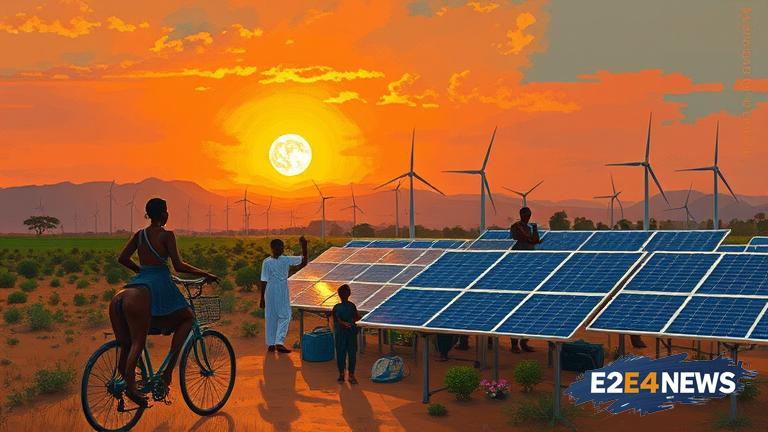The African continent is witnessing a significant shift towards renewable energy, driven by the need to address the pressing issues of energy access, climate change, and sustainable development. With many countries still struggling to provide electricity to their populations, renewable energy has emerged as a viable solution. Solar and wind power are becoming increasingly popular, with countries like South Africa, Egypt, and Morocco leading the way. The cost of renewable energy technologies has decreased dramatically over the years, making them more competitive with fossil fuels. This has led to a surge in investment in the sector, with many international companies and organizations committing to support Africa’s renewable energy ambitions. The African Union’s Agenda 2063 has set a target of ensuring access to clean and affordable energy for all Africans by 2030. To achieve this, the continent will need to increase its renewable energy capacity significantly. Several countries have already made significant strides in this direction, with Kenya, for example, aiming to generate 70% of its electricity from renewable sources by 2030. Rwanda has also set an ambitious target of becoming a carbon-neutral economy by 2050. The use of renewable energy is not only good for the environment, but it also has numerous economic benefits. It can create jobs, stimulate local economies, and reduce dependence on imported fossil fuels. Furthermore, renewable energy can help to improve energy security, reduce the risk of price volatility, and enhance energy independence. However, despite the many benefits, there are still several challenges that need to be addressed. These include the lack of infrastructure, limited access to financing, and the need for policy and regulatory frameworks that support the development of renewable energy. To overcome these challenges, African countries will need to work together, share knowledge and expertise, and attract investment from international partners. The private sector also has a critical role to play, with many companies already investing heavily in renewable energy projects across the continent. International organizations, such as the African Development Bank and the International Renewable Energy Agency, are also providing support and guidance to help Africa achieve its renewable energy goals. In addition, there is a growing recognition of the importance of renewable energy in achieving the United Nations’ Sustainable Development Goals (SDGs). SDG 7, which focuses on affordable and clean energy, is particularly relevant to Africa’s renewable energy ambitions. As the continent continues to grow and develop, it is likely that renewable energy will play an increasingly important role in meeting its energy needs. With the right policies, investments, and partnerships in place, Africa can unlock its vast renewable energy potential and create a more sustainable, prosperous future for all its citizens. The benefits of renewable energy are numerous, and it is essential that African countries continue to prioritize its development. By doing so, they can reduce their reliance on fossil fuels, mitigate climate change, and create a better future for generations to come. In conclusion, Africa’s renewable energy revolution is gaining momentum, and it is essential that the continent continues to work together to achieve its ambitious goals. With the right support and investment, Africa can become a leader in the global transition to renewable energy, and create a more sustainable, prosperous future for all its citizens.
